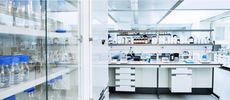How Has the Role of a Water Lab Receptionist Evolved?


You may not realize it, but the role of front desk employee can greatly impact the success of your water lab's operation and its clients.
The receptionist is often the first face and voice customers encounter, which is why employing someone with superb communication and people skills is nonnegotiable. But water labs, in particular, have added many responsibilities to the front desk's role, requiring receptionists to wear a few different hats — from diplomat and sales associate to technical specialist and project manager. Learn from one successful lab receptionist how you can better leverage your savvy front desk agent.
Becoming a Fountain of Knowledge
"It's a little intimidating, in some ways," explained Melissa A., the front desk receptionist and general manager for water testing lab Nova Biologicals. On any given day, she gets calls from customers spanning a range of industries and asking complicated questions about the tests her lab offers.
Melissa's lab experience began two years ago, following a position in retail management. She describes the career change as having "a big learning curve," without a lot of formal technical training. However, she took it upon herself to get up to speed by asking questions, citing lab technicians and other staffers as helpful and supportive in her desire for on-the-job education.
While she doesn't consider herself a technical expert, customers expect her to have answers at the ready — and for that reason, Melissa is always prepared. "I think the front desk person really has to be aware of (testing) requirements," she said, adding that while people in this position may not necessarily know all the ins and outs of the requirements, knowing their general differences across industries is key. This awareness allows receptionists to make an important first impression on customers.
Melissa also found that utilizing IDEXX experts greatly helped her while wearing the part-time hat of technical specialist, specifically when answering unanticipated customer questions. For instance, when a healthcare customer inquired about his facility's specific Legionella testing requirements, an IDEXX expert walked Melissa through the process with the caller, helping her direct him to several highly reliable resources — such as websites for ASHRAE, The Joint Commission, the World Health Organization, the U.S. Environmental Protection Agency — as well as state-specific resources to help him determine whether his facility was in compliance.
Because water testing standards change over time, it's important for receptionists to keep on top of them. Being familiar with resources like these can help your front desk staffers stay in the know.
Executing on Speedy Delivery
In addition to technical knowledge, receptionists are facilitating the flow of information, the quality control (QC) process, and formal reporting. QC and reporting timeliness can massively impact client operations. For example, a building owner might be anxiously awaiting the results of a Legionella test to validate their water safety plan. No matter the size of the business, time is money, and waiting on reports or important testing supplies can cripple earnings.
According to Melissa, she's often faced with an upward of 20 reports that need expediting. Not only is she in charge of ensuring each report is complete, but she also needs to be aware of any that may need special handling.
Recently, she was instrumental in getting results to a client quickly, as her lab was testing drugs for cancer patients awaiting treatment. In this scenario, time was of the essence, which is all too familiar for water testing labs: Any delay in test results could mean the difference in crops being contaminated with unsafe levels of E. coli or business owners unknowingly having traces of dangerous Legionella in their pipes.
Taking on the Role of Team Translator
Melissa said one of the most "challenging but rewarding" aspects of her job is serving as a technical translator between lab techs and customers. In general, lab techs can have difficulty communicating with customers, especially when explaining dense, technical information — and that's where receptionists come in.
Though she may not understand every granular detail lab techs relay to her, Melissa can help customers understand the complex information they're presented with. Without a "translator," customers could feel overwhelmed by processes or results and take their business elsewhere.
Acting as a Lab Diplomat
As with any client-facing position, not every customer interaction will be seamless. With water labs, front desk personnel risk getting caught in the middle of miscommunications between lab staffers and clients, which can get extremely uncomfortable if not handled with care.
The key in these predicaments, Melissa explained, is staying focused on the issue at hand and not making it personal. In general, she recommends always using the clearest form of communication possible — both when identifying the problem and determining resolutions.
"Be transparent," she advised, adding that these problems often stem from a simple lack of information on one end. When the water lab is at fault, "own your mistakes and apologize." She also said you should talk through the problem with your customer until both sides reach a suitable resolution. In her experience, this approach of "talking it out" has always been a recipe for success.
While the front desk receptionist at a water lab is an evolving role, it has never come with more responsibility than today. From the essential everyday tasks of answering phones and managing calendars to processing customer requests with speed, it's a position that requires a competent and nimble person.
While not everyone is capable of wearing so many hats with such grace, those who dare to do so will play an integral role in the overall chain of the water lab workflow — as long as they "never stop learning," in Melissa's words.






